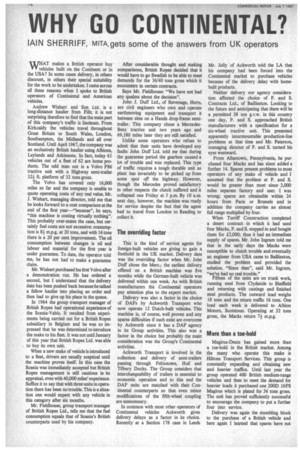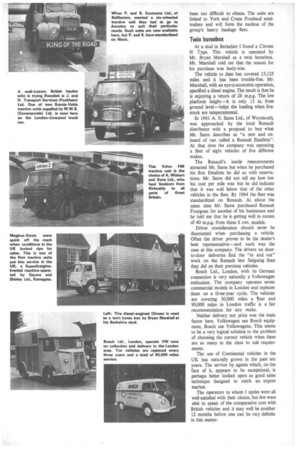WHY GO CONTINENTAL?
Page 76

Page 77

If you've noticed an error in this article please click here to report it so we can fix it.
IAIN SHERRIFF, MITA, gets some of the answers from UK operators rAT makes a British operator buy ehicles built on the Continent or in the USA? In some cases delivery, in others discount, in others their special suitability for the work to be undertaken. I came across all these reasons when I spoke to British operators of Continental and American vehicles.
Andrew Wishart and Son Ltd. is a long-distance haulier from Fife; it is not surprising therefore to find that the main part of this company's traffic is linoleum. From Kirkcaldy the vehicles travel throughout Great Britain to South Wales, London, Southampton, the Midlands and all over Scotland. Until April 1967, the company was an exclusively British haulier using Albions, Leylands and Atkinsons. In fact, today 61 vehicles out of a fleet of 62 are home products. The odd man out is a Volvo F86 tractive unit with a Highway semi-trailer 321 ft. platform of 32 tons gross.
The Volvo has covered only 16,000 miles so far and the company is unable to quote operating costs of any real value. Mr. J. Wishart, managing director, told me that he looks forward to a cost comparison at the end of the first year—"because", he says, "this machine is costing virtually nothing". This probably over-states the case, but certainly fuel costs are not excessive: consumption is 84m.p.g. at 20 tons, and with 16 tons there is a 20 per cent improvement. The oil consumption between changes is nil and labour and material for the first year is under guarantee. To date, the operator told me, he has not had to make a guarantee claim.
Mr. Wishart purchased his first Volvo after a demonstration run. He has ordered a second, but I understand that the delivery date has been pushed back because he talked a fellow haulier into placing an order and then had to give up his place in the queue.
In 1964 the group transport manager of British Ropes had operational experience of the Scania-Vabis. It resulted from experiments being carried out for a British Ropes subsidiary in Belgium and he was so impressed that he was determined to introduce the make to his fleet. It was not until January of this year that British Ropes Ltd. was able to buy its own unit.
When a new make of vehicle is introduced to a fleet, drivers are usually sceptical until the machine proves itself. In this case the Scania was immediately accepted but British Ropes management is still cautious in its appraisal, even with 40,000 miles' experience. Suffice it to say that with three units in operation there has been no trouble. This is a situation one would expect with any vehicle in this category after six months.
Mr. Fieldhouse, group transport manager of British Ropes Ltd., tells me that the fuel consumption equals that of Scania's British counterparts used by his company. After considerable thought and making comparisons, British Ropes decided that it would have to go Swedish to be able to meet demands for the 36/40 tons gross which it encounters in certain contracts.
Says Mr. Fieldhouse: "We have not had any qualms about the decision".
John J. Duff Ltd., of Stevenage, Herts, are civil engineers who own and operate earthmoving equipment and transport it between sites on a Hands drop-frame semitrailer. This company chose a MercedesBenz tractive unit two years ago and 69,180 miles later they are still satisfied.
Unlike some operators who refuse to admit that their units have developed any faults John Duff Ltd. told me that during the guarantee period the gearbox caused a lot of trouble and was replaced. This type of traffic requires a tough durable unit as plant has invariably to be picked up from some spot off the highway. However, though the Mercedes proved satisfactory in other respects the clutch suffered and it collapsed one Friday at 3 p.m. By 10 a.m. next day, however, the machine was ready for service despite the fact that the agent had to travel from London to Reading to collect it.
The overriding factor
This is the kind of service agents for foreign-built vehicles are giving to gain a foothold in the UK market. Delivery date was the overriding factor when Mr. John Duff chose the Merc.; the earliest delivery offered on a British machine was five months while the German-built vehicle was delivered within one week. As with British manufacturers the Continental operators pay attention plus to the export market.
Delivery was also a factor in the choice of DAFs by Ackworth Transport who now operate 12 Dutch-built vehicles. This machine is, of course, well proven and any spares difficulties if such exist are overcome by Ackworth since it has a DAF agency in its Group activities. This also was a factor in the choice but probably the main consideration was the Group's Continental activities.
Ackworth Transport is involved in the collection and delivery of semi-trailers passing through Felixstowe, Hull and Tilbury Docks. The Group considers that interchangeability of trailers is essential to economic operation and to this end the DAF units are matched with their Continental counterparts so that even minor modifications of the fifth-wheel coupling are unnecessary.
In common with most other operators of Continental vehicles Ackworth gives delivery delays as a factor in its choice. Recently at a Section 178 case in Leeds Mr. Jolly of Ackworth told the LA that his company had been forced into the Continental market to purchase vehicles because of the delivery delay with homebuilt products.
Neither delivery nor agency consideration affected the choice of P. and S. Contracts Ltd., of Baillieston. Looking to the future and anticipating that there will be a permitted 38 ton g.v.w. in this country one day, P. and S. approached British manufacturers with a specification for a six-wheel tractive unit. This presented apparently insurmountable production-line problems at that time and Mr. Paterson, managing director of P. and S. turned his eyes westward.
From Allantown, Pennsylvania, he purchased four Macks and has since added a further 14. Spares present problems to most operators of any make of vehicle and I assumed that the problem at P. and S. would be greater than most since 3,000 miles separate factory and user. I was wrong; spares are obtainable within 24 hours from Paris or Brussels and in addition the company carries an almost full range multiplied by four.
When Turriff Construction completed a desert contract in which it had used four Macks, P. and S. stepped in and bought them for £2,000; thus it had an immediate supply of spares. Mr. John Ingram told me that in the early days the Macks were susceptible to clutch trouble and eventually an engineer from USA came to Baillieston, studied the problem and provided the solution. "Since then", said Mr. Ingram, "we've had no real trouble."
Fifteen of the units are on trunk work, running steel from Clydeside to Sheffield and returning with castings and finished steel products. The outward load weighs 18 tons and the return traffic 16 tons. One load each week is delivered to Albion Motors, Scotstoun. Operating at 32 tons gross, the Macks return 71 m.p.g.
More than a toe-hold
Magirus-Deutz has gained more than a toe-hold in the British market. Among the many who operate this make is Hiltons Transport Services. This group is constantly expanding and obtaining new and heavier traffics. Until last year the group operated 400 British medium-range vehicles and then to meet the demand for heavier loads it purchased one 200D 16FS Magirus which is plated for 36 tons gross. The unit has proved sufficiently successful to encourage the company to put a further four into service.
Delivery was again the stumbling block to the purchase of a British vehicle and here again I learned that spares have not been too difficult to obtain. The units are linked to York and Crane Fruehauf semitrailers and will form the nucleus of the group's heavy haulage fleet.
Twin horsebox At a stud in Berkshire I found a Citroen H Type. This vehicle is operated by Mr. Bryan Marshall as a twin horsebox. Mr. Marshall told me that the reason for his purchase was body-size.
The vehicle to date has covered 13,125 miles and it has been trouble-free. Mr. Marshall, with an eye to economic operation, specified a diesel engine. The result is that he is enjoying a return of 26 m.p.g. The low platform height—it is only 13 in. from ground level—helps the loading when livestock are temperamental.
In 1961 A. E. Sams Ltd., of Weymouth, was approached by the local Renault distributor with a proposal to buy what Mr. Sams describes as "a new and unheard of van called a Renault Estafette". At that time the company was operating a fleet of eight vehicles of five different makes.
The Renault's inside measurements attracted Mr. Sams but when he purchased his first Estafette he did so with reservations. Mr. Sams did not tell me how low his cost per mile was but he did indicate that it was well below that of the other vehicles in the fleet. By 1964 the fleet was standardized on Renault. At about the same time Mr. Sams purchased Renault Fourgons for another of his businesses and he told me that he is getting well in excess of 40 m.p.g. from these 6 cwt. models.
Driver consideration should never be discounted when purchasing a vehicle. Ofteri the driver proves to be the dealer's best representative—and such was the case at this company. The drivers on doorto-door deliveries find the "in and out" work on the Renault less fatiguing than they did on their previous vehicles.
Bosch Ltd., London, with its German connection is very naturally a Volkswagen enthusiast. The company operates seven commercial models in London and replaces them on a three-year cycle. The vehicles are covering 30,000 miles a rear and 90,000 miles in London traffic is a fair recommendation for any make.
Neither delivery nor price was the main factor here. Volkswagen use Bosch equipment, Bosch use Volkswagens. This seems to be a very logical solution to the problem of choosing the correct vehicle when there are so many in the class to suit requirements.
The use of Continental vehicles in the UK has naturally grown in the past ten years. The service by agents which, on the face of it, appears to be exceptional, is perhaps better looked upon as good sales technique designed to catch an export market.
The operators to whom I spoke were all well-satisfied with their choice, but few were able to speak of the comparative cost with British vehicles and it may well be another 12 months before one can be very definite in this matter.




































































































































